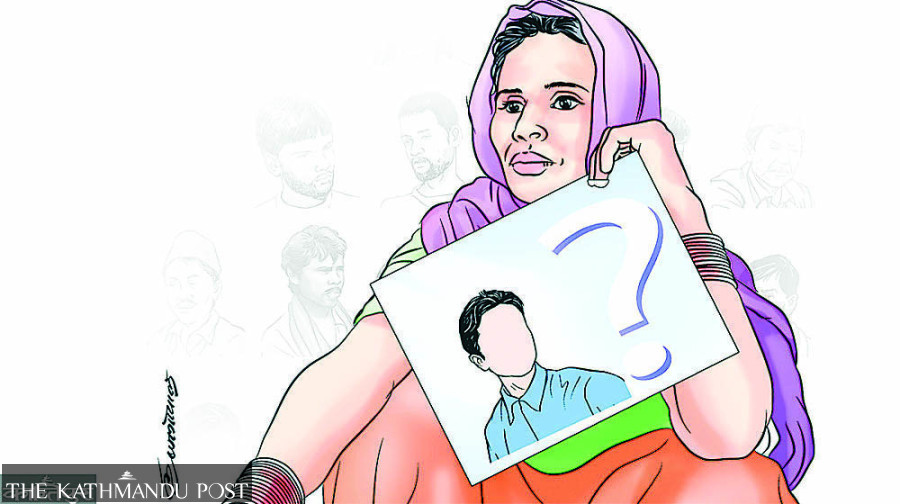National
Political parties resume talks on overdue transitional justice bill revision
On the agenda: Concerns of victims not directly involved, consensus on reduced sentencing
Post Report
Cross-party discussions to amend the Enforced Disappearances Enquiry, Truth and Reconciliation Commission Act that had stalled after the changes in the ruling coalition in March first week, have resumed.
A meeting of the top leaders from three major parties, along with their chief whips, on Thursday agreed to finalise the amendment bill, which is currently under consideration in the Law, Justice and Human Rights Commission of the House of Representatives.
The meeting that was called by Prime Minister and CPN (Maoist Centre) Chairman Pushpa Kamal Dahal also decided to task the chief whips of three major parties to find common ground on the contentious provisions in the bill. Prime Minister Dahal, Nepali Congress President Sher Bahadur Deuba, who is also the leader of the main opposition, and ruling coalition partner CPN-UML chair KP Sharma Oli at the meeting decided to entrust the cross-party team with the responsibility.
“We have agreed to reach a consensus on the contentious issues in the bill,” Nepali Congress Chief Whip Ramesh Lekhak told the Post. “We chief whips of the three parties have been tasked to resume dialogue to find common ground.”
So long as the Maoist-Congress alliance was intact, the two parties unanimously advocated for the bill's endorsement. But the UML was not ready. Before endorsement, the bill needed to be revised, adhering to international standards and ensuring that it prohibited amnesty.
The two parties accused the UML of politicising the matter and creating barriers to its endorsement. But the dynamics changed with a change in the ruling coalition. Breaking his year-long ties with the Congress, Dahal, on March 4, joined hands with the UML and the Rastriya Swatantra Party. Since then, the Congress has been reluctant to proceed with the bill.
Since March 3, a day before the previous coalition broke, there had been no discussion on the bill.
Talking to the Post, Padam Giri, minister for Law, Justice and Parliamentary Affairs who was present at Thursday’s meeting, said the ruling and opposition parties have realised that the Act should be amended without further delay in order to bring the transitional justice process on track.
“Further delaying the process means making it more complex. All the parties realise that the long-pending process must be concluded at the earliest,” Giri told the Post.
He said while the three chief whips will continue the discussion, the top leadership will also sit again for an agreement. “I expect that the next meeting, which will be held shortly, will make some breakthrough in order to resolve the contentious issues.”
The amendment bill was registered in the lower house in March last year and sent to the House committee for finalisation. However, differences persist.
After over a year-long discussions, the parliamentary committee narrowed down the differences to four points. In March first week, it further reduced the differences to two points after the parties agreed to list arbitrary killings as serious violation of human rights (thus non-amnestiable), and to open the doors for the victims, who refuse to reconcile, for prosecution.
The House panel had been struggling to decide whether to categorise arbitrary killings or all killings except those that occurred in clashes as serious violations of human rights. It has also been unable to settle what happens in case the victims of human rights violations refuse to reconcile. The issues were settled after the UML showed flexibility.
Now, the parties have two major issues to settle. They differ on how to address the concerns of those affected by the conflict even if they were not directly involved. They also have not found a meeting point on reduced sentencing.
The delay in amending the Act has left the Truth and Reconciliation Commission and the Commission for the Investigation on Enforced Disappeared Persons paralysed for around two years.
In July 2022, the Deuba government decided to extend the terms of the commissions without retaining their chairs and members. Despite the government’s claim that the amendment bill would be endorsed by October 2022, which would also open the door for recruiting new office bearers, there has been no progress even after the latest extension.
The government is preparing to give a new lease of life to the commissions whose terms are set to expire on July 15. Though a task force led by former Chief Justice Om Prakash Mishra has been formed to nominate candidates for office bearers in the commissions, it has yet to start its work.
Conflict victims and human rights defenders are demanding that appointments be made only after amending the Act.
“I am hopeful that the Act will be amended during the ongoing session of the federal parliament,” said Giri, the law minister.




 9.83°C Kathmandu
9.83°C Kathmandu













